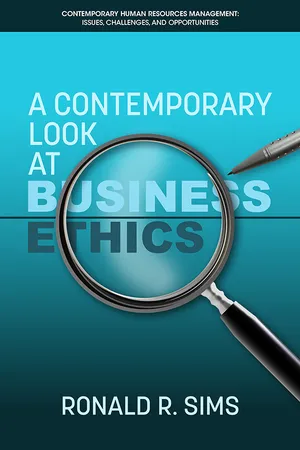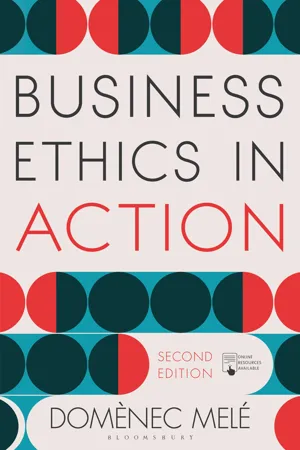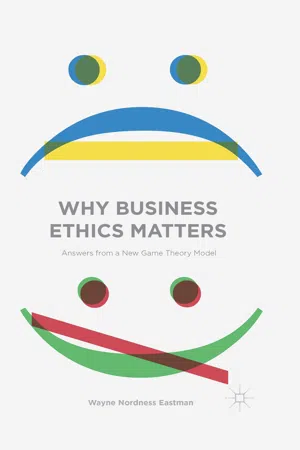Business
Business Ethics
Business ethics refers to the moral principles and values that guide the behavior and decision-making processes within a business environment. It involves considering the impact of business actions on various stakeholders, including customers, employees, suppliers, and the community, and making decisions that align with ethical standards and social responsibility. Adhering to business ethics can enhance reputation, build trust, and contribute to long-term success.
Written by Perlego with AI-assistance
Related key terms
1 of 5
11 Key excerpts on "Business Ethics"
- eBook - PDF
Business Ethics
Ethical Decision Making and Cases
- O. C. Ferrell, John Fraedrich, Ferrell, , O. C. Ferrell, John Fraedrich, Ferrell, , O. C. Ferrell, John FraedrichFerrell(Authors)
- 2021(Publication Date)
- Cengage Learning EMEA(Publisher)
In this chapter, we first develop a definition of Business Ethics and discuss why it has become an important topic in business education. We also discuss why studying busi-ness ethics can be beneficial. Next, we examine the evolution of Business Ethics in North America. Then we explore the performance benefits of ethical decision making for busi-nesses. Finally, we provide a brief overview of the framework we use for examining Business Ethics in this text. 1-1 Business Ethics Defined To understand Business Ethics, you must first recognize that most people do not have specific definitions they use to define ethics-related issues. The terms morals, principles, values, and ethics are often used interchangeably, and you will find this is true in companies as well. Consequently, there is much confusion regarding this topic. To help you understand these differences, we discuss these terms. For our purposes, morals refer to a person’s personal philosophies about what is right or wrong. The important point is that when one speaks of morals, it is personal or singular. Morals relate to you and you alone. You may use your personal moral convictions in mak-ing ethical decisions in any context. Business Ethics comprises organizational principles, values, and norms that may originate from individuals, organizational statements, or from the legal system that primarily guide individual and group behavior in business. Principles are specific and pervasive boundaries for behavior that should not be violated and often become the basis for rules. Some examples of principles could include human rights, free-dom of speech, and the fundamentals of justice. Values are enduring beliefs and ideals that are socially enforced. Several desirable or ethical values for business today are teamwork, trust, and integrity. Morals, values, and principles describe positive or good traits that are often applied to the business organization or industry. - eBook - PDF
- Ronald R. Sims(Author)
- 2010(Publication Date)
- Information Age Publishing(Publisher)
A Look at the Future of Ethics in Business Ethics has to do with behavior—specifically, one’s moral behavior (i.e., right versus wrong, good versus bad, and the many shades of gray in between)— with respect to society. This book has emphasized the reality that the extent to which one’s behavior measures up to societal standards is typically used to gauge one’s ethicality—and as evidenced in our discussion throughout this book, this is true for organizations as well as individuals. There are a variety of standards for societal behavior, of course, so ethical behavior is often characterized with respect to certain contexts. The Ethics Resource Center says, “Business Ethics refers to clear standards and norms that help employees to distinguish right from wrong behavior at work” (p. 2). 2 In the context of doing business, ethics refers to the extent to which a person’s behavior measures up to such standards as the law, organizational policies, professional and trade association codes, popular expectations regarding fairness and rightness, plus one’s own internalized moral standards. It can fairly be argued that an ethical person behaves appropriately in all societal contexts. This indeed may be so, in which case one might prefer the term “ethics in business” to “Business Ethics.” The distinction is subtle, but serves as a reminder that morality may be generalized from context to context. Adam Smith, for example, saw no need for ethical relativism when it comes to business: It is impossible to determine just how business became separated from eth- ics in history. If we go back to Adam Smith, we find no such separation. In addition to his famous book on business and capitalism, The Wealth of Na- tions, Adam Smith also wrote The Theory of Moral Sentiments, a book about our ethical obligations to one another. It is clear that Smith believed that business and commerce worked well only if people took seriously their obli- gations and, in particular, their sense of justice. - No longer available |Learn more
- (Author)
- 2014(Publication Date)
- Learning Press(Publisher)
____________________ WORLD TECHNOLOGIES ____________________ Chapter- 4 Business Ethics Business Ethics (also known as Corporate ethics) is a form of applied ethics or professional ethics that examines ethical principles and moral or ethical problems that arise in a business environment. It applies to all aspects of business conduct and is relevant to the conduct of individuals and business organizations as a whole. Applied ethics is a field of ethics that deals with ethical questions in many fields such as medical, technical, legal and Business Ethics. Business Ethics can be both a normative and a descriptive discipline. As a corporate practice and a career specialization, the field is primarily normative. In academia descriptive approaches are also taken. The range and quantity of business ethical issues reflects the degree to which business is perceived to be at odds with non-economic social values. Historically, interest in Business Ethics accelerated dramatically during the 1980s and 1990s, both within major corporations and within academia. For example, today most major corporate websites lay emphasis on commitment to promoting non-economic social values under a variety of headings (e.g. ethics codes, social responsibility charters). In some cases, corporations have redefined their core values in the light of business ethical considerations (e.g. BP's beyond petroleum envi-ronmental tilt). Why Business Ethics? Discussion on ethics in business is necessary because business can become unethical, and there are plenty of evidences as in today on unethical corporate practices. Even Adam Smith opined that 'People of the same trade seldom meet together, even for merriment and diversion, but the conversation ends in a conspiracy against the public, or in some contrivance to raise prices'. Firms and corporations operate in the social and natural environment. - eBook - PDF
Ethics and Corporate Social Responsibility
Why Giants Fall
- Ronald R. Sims(Author)
- 2003(Publication Date)
- Praeger(Publisher)
Ethical behavior is that which isaccepted as morally "good" and "right" as opposed to "bad" or "wrong" in a particular setting. For the individual that means acting in ways consistent with one's personal values and the commonly held values of the organization and society. Is it ethical, for example, to pay a bribe to obtain a business contract in a foreign country? Is it ethical to allow your company to withhold information that might discourage a job candidate from joining your organization? Is it ethical to ask someone to take a job you know will not be good for their career progress? Is it ethical to do personal business on company time? The point of asking is to remind organizations that the public-at-large is demanding that government officials, business leaders and manag- ers, workers in general, and the organizations they represent all act according to high ethical and moral standards. There is every indication that the future will bring a renewed concern with maintaining high standards of ethical behavior in organizational transactions and in the workplace. To understand Business Ethics, it is useful to comment on the relation- ship between ethics and morality. Ethics is the discipline that deals with what is good and bad and with moral duty and obligation. Ethics can also be regarded as a set of moral principles or values. Morality is a system or doctrine of moral conduct. Moral conduct refers to that which relates to principles of right and wrong in behavior. We can think of ethics and morality as being so similar that we may use the terms interchangeably to refer to the study of fairness, justice, and right and wrong behavior in business. Business Ethics, therefore, is concerned with good and bad or right and wrong behavior and practices within a business context. Concepts of right and wrong are increasingly being interpreted to include the more difficult and subtle questions of fairness, justice, and equity. - No longer available |Learn more
Business Ethics in Action
Managing Human Excellence in Organizations
- Domènec Melé(Author)
- 2019(Publication Date)
- Bloomsbury Academic(Publisher)
Assuming ethics to be a guide for human excellence, ‘Business Ethics’ can be defined as a guide for human excellence in business . The scope of Business Ethics includes four constitutive aspects ( Figure 1.1 ): Figure 1.1 Constitutive aspects of Business Ethics Individual Behaviors Organizational Societal & Ecological Managerial and Governmental IMPROVEMENTS DILEMMAS ACCEPTABILITY Business Ethics INTRODUCING Business Ethics 17 • Individual ethical behaviour . Persons act within or on behalf of organizations and their decisions, actions and behaviours are studied by Business Ethics. This constitutive aspect includes ethics in personal decision-making and personal responsibility and also the role of virtues in personal behaviour. • Managerial and corporate governmental ethics . This relates to the manag-er’s work and corporate governance activity. Entrepreneurial ethics can also be included in this constitutive element of Business Ethics. Managers direct, coordinate, motivate and supervise people to perform actions for a common purpose. Corporate governance approves major strategies and supervises the company’s senior management. Decisions and leadership of senior managers and directors have an influence on the behaviour of other managers and employees and on the organization as a whole. • Organizational ethics . This refers to the ethical dimension of the business organization. It includes strategies, objectives, structure, systems, procedures, rules, and so on. As a result of several factors, a certain culture is developed within the organization. Organizational ethics gives guidelines on how to fos-ter human excellence within organizations and to promote ethical cultures. • Societal and ecological ethics . This covers the vast field of the business– society relationship and business impact on the environment. - eBook - PDF
- Robert MacIntosh, Kevin D O'Gorman(Authors)
- 2015(Publication Date)
- Goodfellow Publishers(Publisher)
It is often down to personal opinion as to what people interpret to be ethical and unethical, but this is to confuse ethics with moral-ity. Although ethics and morality were once synonymous, it is now largely accepted that morality extends to those one knows, while ethics may be applied to those not known. As such, we tend to think of morality as personal, and ethics as political or professional. The example of reckless lending by bankers Introducing Management in a Global Context 164 and financiers prior to the 2008 UK recession is a relatively closed case in clearly delineated unethical business practice. You will soon appreciate that ethical actions are contextual and harmony between the individual and society is not necessarily always apparent or the appropriate goal. Debates over ethics allow people to voice their opinions and beliefs, in an attempt to change business practice for what they see is for the eventual good. Ethics in business There is no single agreed definition of ethics. Christie et al. (2003, p. 266) define ethics as “a systematic approach to moral judgments based on reason, analy-sis, synthesis, and reflection,” with Business Ethics being “the study of what constitutes right or wrong, good or bad human conduct in a business environ-ment.” The company may be held responsible for both its conduct and that of individuals affiliated with the organization, which can be difficult to manage. For example, in a multinational corporation that relies heavily on outsourcing to specialist companies, how can that one company facilitate the monitoring process of all these firms, ensuring they adhere to their rules and regulations, and conform to what they believe is ethical and acceptable behaviour? Individual beliefs, prejudices, values and tendencies inform interpretations of a given situation. Mediation or balancing is required in order to integrate these differences into an organisation. - eBook - PDF
- Richard Mann, Barry Roberts(Authors)
- 2019(Publication Date)
- Cengage Learning EMEA(Publisher)
15 securities fraud. In 2013, large international banks faced a widening scandal—and substantial fines—over attempts to rig benchmark interest rates, including the London Interbank Offered Rate (LIBOR). Ethics can be defined broadly as the study of what is right or good for human beings. It attempts to deter- mine what people ought to do, or what goals they should pursue. Business Ethics, as a branch of applied ethics, is the study and determination of what is right and good in business settings. Business Ethics seeks to understand the moral issues that arise from business practices, insti- tutions, and decision making, and their relationship to generalized human values. Unlike legal analyses, analyses of ethics have no central authority, such as courts or leg- islatures, upon which to rely, nor do they follow clear-cut universal standards. Nonetheless, despite these inherent limitations, it still may be possible to make meaningful ethical judgments. To improve ethical decision making, it is important to understand how others have approached the task. C HAPTER 2 Our characters are the result of our conduct. ARISTOTLE, NICOMACHEAN ETHICS (C. 335 BCE) 1. Describe the difference between law and ethics. 2. Compare the various ethical theories. 3. Describe cost-benefit analysis and explain when it should be used and when it should be avoided. 4. Explain Kohlberg’s stages of moral development. 5. Explain the ethical responsibilities of business. Business Ethics B usiness ethics is a subset of ethics: no special set of ethical principles applies only to the world of business. Immoral acts are immoral, whether or not a businessperson has committed them. In the last few years, countless business wrongs, such as insider trading, fraudulent earnings statements and other accounting mis- conduct, price-fixing, concealment of dangerous defects in products, reckless lending and improper foreclosures in the housing market, and bribery, have been reported almost daily. - eBook - PDF
- Godwin .U. Enebeli(Author)
- 2020(Publication Date)
- Society Publishing(Publisher)
Business Ethics 217 The employees are self-motivated to achieve the goals of the organization. • Economic responsibility. This business ethic helps to guide the individual’s economic decision. There are those people who believe that borrowing money for handling financial matters in business is wrong (They are hard to come by) and there are those people who do not. • Technical morality. People are expected to follow some rules that are made and enforced by those in charge. As a result, it brings people with different professions together and they can work together smoothly. • Legal responsibility. It is expected that everyone follows the laws set by the government and failure to do so results in strict disciplinary measures by the government. Every organization or business is expected to follow these laws to avoid conflicts. 8.4. PRINCIPLES OF Business Ethics Ethical principles are guidelines that help those people that are doing businesses to be able to make decisions that are considered right as opposed to those that are wrong. The principles also provide a forum whereby when a decision is made regarding a given situation then other people are given a chance of weighing in the decision. 8.4.1. Honesty Those people that are in charge should ensure that there is transparency in what they are doing. They should ensure that people can be able to rely on them without hesitation or questioning their motives. They should not lie to people by giving them false information or withholding information instead when they are required they should be accountable for the decisions they made regarding anything in the business 8.4.2. Integrity Those in charge earn the respect and loyalty of those that they serve through the employee’s integrity which is defined as the trust gained as a result of unchanging behavior. This requires self-sacrifice at all times even though one might incur losses along the way. One is expected to perform well even - eBook - PDF
Economy, Company, Management
Introduction to Business Administration
- Jean-Paul Thommen, Stefan Grösser(Authors)
- 2014(Publication Date)
- Versus(Publisher)
118 Chapter 4: Business Ethics ............................................................................................................................................................................. study of ethics. Ethics, in turn, is part of the scientific discipline of philosophy which examines the moral actions of people 1 : 1. Description and justification function (descriptive ethics): Ethics is interested in the standards and moral principles are used to judge people or companies or what standards and rules are even possible. Ethics does not say what is morally good or bad, but it tries to understand and justify why a particular behaviour is described as good or bad. 2. Regulation function (normative ethics): Unlike the descriptive stream of ethics, nor-mative ethics attempts to show what standards and principles should be followed. This is reflected by the fact that ethics has developed its own understanding accord-ing to which the people of a society should follow. Here, morality is understood as a set of moral standards and values which express commandments (thou shalt …) and prohibitions (thou shalt not …). Normative ethics assumes that compliance with these moral standards and values result in living a good life, performing just actions, and making rational decisions. Drawing from the perspective of general ethics, Business Ethics involve the following tasks: 1. Description of the norms and rules which executives follow. 2. Description of ethical issues and challenges which companies face. 3. Evaluation of company behaviour defining reasons why the behaviour is ethically good or bad. 4. In the sense of an applied science of management, the ultimate objective of busi-ness ethics is to understand the consequences of business decisions. In addition, concepts, models, and instruments must be provided by which ethical issues can be analysed and justified. - eBook - PDF
Business Ethics
A Textbook with Cases
- William Shaw(Author)
- 2016(Publication Date)
- Cengage Learning EMEA(Publisher)
If there were not already fairly widespread agreement about these principles, our social order would not be sustainable. In addition we can talk about our morality in the broad sense , meaning not just the principles of conduct that we embrace but also the values, ideals, and aspirations that shape our lives. Many different ways of living our lives would meet our basic moral obli-gations. The type of life each of us seeks to live reflects our individual values—whether following a profession, devoting ourselves to community service, raising a family, seek-ing solitude, pursuing scientific truth, striving for athletic excellence, amassing political power, cultivating glamorous people as friends, or some combination of these and many other possible ways of living. The life that each of us forges and the way we understand that life are part of our morality in the broad sense of the term. It is important to bear this in mind throughout your study of Business Ethics. Although this book’s main concern is with the principles that ought to govern conduct in certain business-type situations—for example, whether a hiring officer may take an applicant’s race into account, whether insider trading is wrong, or whether corporate bribery is permissible in countries where people turn a blind eye to it—your choices in the business world will also reflect your other values and ideals or, in other words, the kind of person you are striving to be. What sort of ideal do you have of yourself as a busi-nessperson? How much weight do you put on profitability, for instance, as against the quality of your product or the socially beneficial character of your service? The decisions you make in your career and much of the way you shape your work-ing life will depend not only on your moral code but also on the understanding you have SUMMARY Part of the point of morality is to make social existence possible by restraining self-interested behavior. - eBook - PDF
Why Business Ethics Matters
Answers from a New Game Theory Model
- Wayne Nordness Eastman(Author)
- 2015(Publication Date)
- Palgrave Macmillan(Publisher)
The standard perspective on why Business Ethics matters goes along with a sense of Business Ethics as weak, or at any rate as weaker than it ought to be. The alternative perspective advanced here goes along with a sense of it as strong both in itself, and relative to its temperamental peers. The standard sense of why Business Ethics matters corresponds to mainstream business Why Business Ethics Matters ● 143 ethics; the alternative sense of why it matters corresponds to a potential critical Business Ethics movement. Such a movement, in addition to, or apart from, engaging in the projects that were discussed in the last chapter, could engage in normative scholarship and practically oriented writing that starts from an assumption that as a business ethicist, one stands at the center of power in the contemporary world, rather than in a peripheral, plaintive position. The conventional understanding of Business Ethics as an underdog corre- sponds well to the practical situation of Business Ethics as a small academic field. The annual meetings of the Academy of Management draw thousands of academics; the annual meetings of the Society for Business Ethics, held in the same city at the same time, draw a very much smaller number. To accord with reality, the claim advanced in this chapter about the ascendance of busi- ness ethics needs to be understood not as a claim that now, or anytime in the foreseeable future, business ethicists will outnumber management professors on business school faculties, or that people in the workforce with job descrip- tions as ethicists will outnumber people with job descriptions as managers. Rather, the claim here needs to be understood as a claim that the system of fused beliefs and practices that both management and Business Ethics profes- sors, as well as the rest of our business school colleagues, uphold and seek to improve, is, more than anything else, what is distinctive about the world we live in now.
Index pages curate the most relevant extracts from our library of academic textbooks. They’ve been created using an in-house natural language model (NLM), each adding context and meaning to key research topics.










